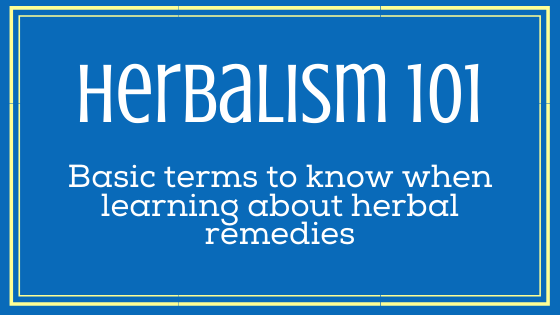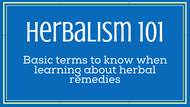Herbalism 101- An introduction to common terms
Posted by TriLight Health on Jun 26th 2020
We often hear from folks who set out to learn about herbs and get overwhelmed. It can feel like learning a new language. There are words that you may feel like you *should* know. But it doesn't quite make sense in the context. Today we hope to be a guide for you and define a few of the words you’re likely to encounter when you study herbalism.

Adaptogen- Herbs that help the body to adapt to stress and changes- both internal and external.
Bitter- A single herb or blend of multiple herbs with a bitter taste most often used to aid digestion. GastroCare contains artichoke leaf which is a bitter.
Contraindication- A health condition or drug interaction for which a particular herb should not be used.
Decoction- A tea blend made from hard materials such as bark, nuts, seeds, and/or roots. These are usually simmered at least 20 minutes.
Emmenagogue- Herbs that regulate and induce menstruation. They are often hormone balancing herbs as well.
Flower Essences: A form of herbal medicine developed by Dr. Edward Bach. They are created by infusing flowers or other plant material in spring water. This is then highly diluted so only the essence remains. Flower essence therapy is primarily used for emotional and psychological well-being.
Galactogogue- Herbs which stimulate breast milk flow. MegaMam contains some of these herbs.
Homeopathy- This is not a form of herbalism but often mislabeled as such. Homeopathy uses highly diluted and specifically prepared plant, mineral, and animal materials. It is based on the premise that “like cures like.”
Infusion- A preparation of soft plant materials such as leaves and flowers. Most often an infusion is made with boiling water to prepare tea. However infusions can be made with cold water and oil or other substances as well.
Mucilage- A thick substance produced by some herbs. It is often described as gummy or gelatinous. Often used in soothing sore throats or topically on wounds.
Poultice- A topical preparation of herbs which may be wrapped in cloth or used directly on the skin. These are usually used wet.
Salve- A topical application of herbs. Prepared by infusing the herbs in oil (often coconut oil, olive oil, or vegetable oil) and then the oil is mixed with beeswax to create a thick substance used on wounds, burns, and other topical uses. Soothing Salve is an example of a salve.
Tincture- An extract of herbs which have been soaked in alcohol, vinegar or glycerine. The herbs are soaked for weeks, strained and rung out or pressed. The tincture results in a liquid which can be further diluted or used as is.
Tonic- A substance, or herb, that improves strength and tone. Tonic herbs are often used daily or on an on-going basis whereas other herbs will be used short-term.
Wildcrafting- Harvesting herbs from the wild. This can be done in one’s own yard, out in nature, and even in the city. Wildcrafting should be done with great care as some herbs may resemble toxic herbs.
What other terms would you like to understand better? Let us know!
There are a lot more than what we’ve included here. These are a few of the most common terms you’ll want to know.





